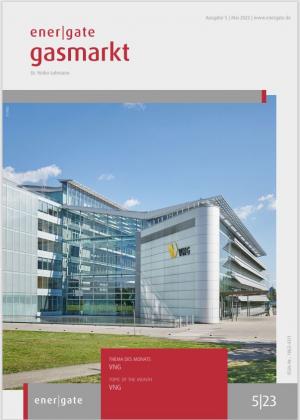The year 2022 was difficult for VNG. The company reported a loss of 337 million euros (not 450 million euros, as I wrote in the last edition after misinterpreting figures in the EnBW annual report). Adjusted earnings before interest and taxes (EBIT) were minus 205 million euros. In 2021, a consolidated profit of 141 euros was achieved, with an EBIT of plus 225 million euros. Nevertheless, and I found this quite impressive, there was no sense of crisis at the annual press conference at the beginning of April. Thanks to the compensation payments from the German government for a part of the loss from the contract with Gazprom Export (ener|gate Gasmarkt 04/23), the settlement with SEFE on the WIEH contract (ener|gate Gasmarkt 11/22) and the capital increase, VNG was able to cope with the loss. The VNG board is increasingly thinking about the future role of VNG, especially in a hydrogen economy. Even though the VG 2030+ strategy is now a few years old, at this year’s VNG annual press conference, I had the impression for the first time that the board at least has a comprehensible idea of how a future business model for VNG could work that fits in with the structure and organisation of the company. More on this later. First, a little about the company's past and present...
Stay up to date with the free Gasmarkt-Newsletter! We will inform you about new issues by e-mail and give you an insight into the contents.
- All Issues
- energate Gasmarkt
- Issue 05|23
- Issue title:
VNG
- Publication date:
- 04.05.2023
- In this issue:
In view of the discussions about the amendment to the German Buildings Energy Act (Gebäudeenergiegesetz – GEG), this amendment would have been a nice Topic of the Month. But for technical reasons, the deadline for this edition was relatively early (24 April). And it was only after the Cabinet approved the bill on 19 April that things really got heated. Personally, I like the fact that the law puts the decarbonisation of the heating market very high on the agenda. Up until now, approaches to decarbonising the heating market have been rather half-hearted. Considering the intensity of the debate, the previous reluctance to act in this area is understandable. In the heating market for existing buildings, the Energiewende (energy transition) is leaving every comfort zone. But this is no excuse: if we want to achieve our climate protection targets, we have to address the issue. In principle, I also like the fact that for the hydrogen option as an instrument for decarbonisation, the distribution grid operators must present a transformation path for the grid. In general, however, the draft has its shortcomings.
In particular, the Federal Ministry of Economics and Climate Action (BMWK) basically relies on the two fulfilment options of heat pumps and green district heating. The assumption is that this will work, especially in the case of heat pumps. This means that the expansion of renewable energies is progressing according to plan, as are the expansion of transmission and distribution grids as well as the market ramp-up and the necessary technological development of heat pumps. Manufacturers are optimistic about the latter. What I find problematic is the abrupt and rigid deadline of 2024 for implementing the "no new gas heating" mantra. Since hydrogen in particular is not (yet?) available, there is of course no solution available at present that involves minimal intervention in existing systems. Proponents of hydrogen solutions need to demonstrate sufficient availability of hydrogen, not just claim it. However, I would have liked to see a more detailed examination of the possible effects of a rising CO2 price and a stronger focus on municipal heating concepts. In addition, perhaps the initial focus should be on decarbonising district heating, as this uses existing systems. Let's see what else the legislative process brings. What will happen if nothing else changes? The number of new gas heating systems installed will increase in 2023, and then existing systems will be used for as long as possible. My concern is that federal policy will have a kind of energy price brake 2.0 experience.
Well, I have spent the whole editorial bothering you with my half-baked reflections on the GEG. But there is more to read in this issue, so please do so with pleasure.
Sales Contact

Frequently Asked Questions
1. What is the energate Gasmarkt?
The energate Gasmarkt provides specialists and executives in the gas industry with up-to-date information and background information on the German and international gas market. The medium expertly explains the most important developments in the fields of market, law, politics and business. In addition, the energate Gasmarkt offers insider information such as market rumors and personal details.
2. What is the energate Jahresreport Gas?
The energate Jahresreport Gas traces the most important market developments of the year and provides a well-founded outlook for the coming months. Gas expert and insider Dr. Heiko Lohmann analyzes relevant events in politics, law and regulation as well as on generation, infrastructure and trade. In addition, the report provides information on changes in the corporate landscape and tracks price developments in market reports. Top decision-makers from the industry use the Jahresreport Gas as a compact chronicle of the year and to assess future market developments.
3. How often are these publications released and in which formats are they available?
The energate Gasmarkt is published monthly. Subscribers will receive the energate Gasmarkt as a print and PDF version in German and English. The Jahresreport Gas is published annually (beginning of December).
4. Can I purchase individual issues of the energate Gasmarkt?
Yes, you can purchase individual isses as print or PDF version. Payment options include purchase on account, credit card or PayPal.
5. How much is a subscription of the energate Gasmarkt and how much does the Jahresreport cost?
A subscription to the energate Gasmarkt (single licence) costs 110,- Euro/month (plus VAT). An edition of the Jahresreport Gas costs regularly 390,- euro (plus VAT).
6. Are there any special conditions if several employees in a company would like to receive the Gasmarkt?
With several Gasmarkt recipients in one company, the price of the second and all other licenses is reduced significantly. We are happy to make you a fair offer for team or corporate licenses!
7. What benefits do I get by registering?
A free energate account is required to order the energate Gasmarkt or the energate Jahresreport Gas. Registered users receive an overview of the contents of the current issue of energate Gasmarkt by e-mail on the day of publication.
8. I would like to read energate Gasmarkt or energate Jahresreport Gas digitally. Where can I find my e-paper version?
As a subscriber to energate Gasmarkt or as a purchaser of energate Jahresreport Gas, you will also receive an e-paper version in addition to the print edition. You can find it at online.energate-gasmarkt.de. Please use your energate account to log in.


